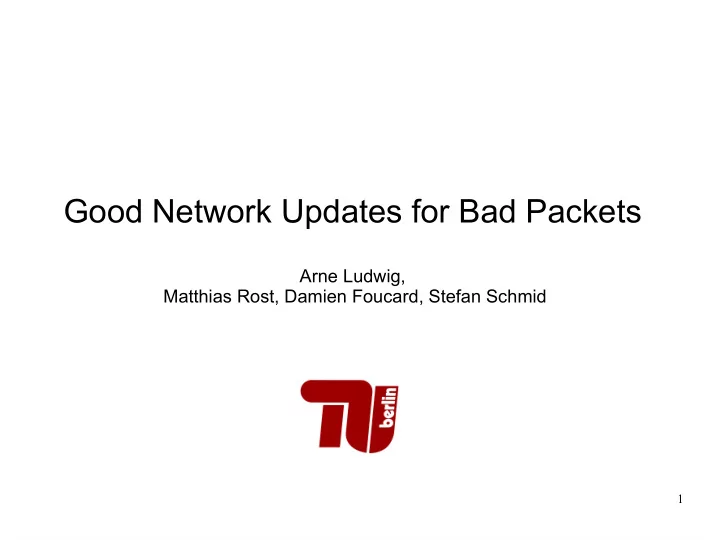

Good Network Updates for Bad Packets Arne Ludwig, Matthias Rost, Damien Foucard, Stefan Schmid 1
Updates happen ● Network updates happen – Changing security policies ● Network updates are challenging – Even with global view ● Potential high damage if fail – Security policy violation 2
Example 3
Example 4
Example Waypoint Enforcement (WPE) 5
Example ● Eventual consistency 6
Example Bad packet ✔ Eventual consistency ➢ Transient consistency? 7
Example ✔ Eventual consistency ➢ Transient consistency? 8
Example ✔ Eventual consistency ➢ Transient consistency? 9
Example ✔ Eventual consistency ➢ Transient consistency? 10
Example ✔ Eventual consistency ➢ Transient consistency? 11
Example ✔ Eventual consistency ✗ Transient consistency 12
Outline ● What could possibly go wrong? ● It's not a trivial thing! ● But we present an optimal solution. 13
Model and a Trivial Compression Solid lines = current path 14
Model and a Trivial Compression Solid lines = current path Dashed lines = new path Flow-specific path 15
Model and a Trivial Compression Solid lines = current path Dashed lines = new path Flow-specific path 16
Model and a Trivial Compression Solid lines = current path Dashed lines = new path Flow-specific path Safe to be updated Safe to be left untouched 17
Consistency Properties ● WPE = every packet traverses the waypoint at least once ● LF = loop freedom 18
Update all “simultaneously“? 19
Update all “simultaneously“? Not possible in practice! What could possibly go wrong? 20
Update all “simultaneously“? Not possible in practice! What could possibly go wrong? Update times can vary significantly (up to 10x higher than median [Dionysus – SIGCOMM'14]) 21
Update all “simultaneously“? 22
Update all “simultaneously“? ● Not waypoint enforced! 23
Delay ? 24
Delay ? ● Not loop free! 25
Update possible? 26
Update possible? 27
Update possible? 28
Update possible? ● Consistent transient states! 29
Rounds ● Round = set of parallel updates ● ➔ Minimize number of rounds / communication overhead 30
Greedy Update Fails ● Greedy approach may: See paper! – take up to times more rounds – fail to find solution 31
Greedy Update Fails ● Greedy approach may: See paper! – take up to times more rounds – fail to find solution 32
WPE - Update Algorithm 1.Switches < WP (new), > WP (old) 33
WPE - Update Algorithm 1.Switches < WP (new), > WP (old) 34
WPE - Update Algorithm 1.Switches < WP (new), > WP (old) 35
WPE - Update Algorithm 1.Switches < WP (new), > WP (old) 2.Switches < WP (new), < WP (old) 36
WPE - Update Algorithm 1.Switches < WP (new), > WP (old) 2.Switches < WP (new), < WP (old) 37
WPE - Update Algorithm 1.Switches < WP (new), > WP (old) 2.Switches < WP (new), < WP (old) 3.Remaining switches 38
WPE - Update Algorithm 1.Switches < WP (new), > WP (old) 2.Switches < WP (new), < WP (old) 3.Remaining switches Constant in 3 rounds, but not LF! 39
LF and WPE Conflict 40
LF and WPE Conflict ● violate WPE; violate LF 41
Mixed Integer Program Minimize Rounds LF WPE 42
Mixed Integer Program Optimal solution Mixed Integer Unclassified Program (stopped 600sec) Not solvable (provably) 43
Solvability Analysis ● % of solvable instances? ● % of failed greedy? ● 1k random permutations per size ● Max duration 600 seconds Greedy MIP Unclear No solution 44
Solvability Analysis Greedy MIP Unclear No solution 45
Solvability Analysis Greedy MIP Unclear No solution 46
Solvability Analysis Greedy MIP Unclear No solution 47
Conclusion ● Transient consistency is not easy to guarantee ● LF and WPE might even conflict ● Greedy can fail to find consistent updates Dynamic WPE + LF updates are hard to find! 48
Recommend
More recommend